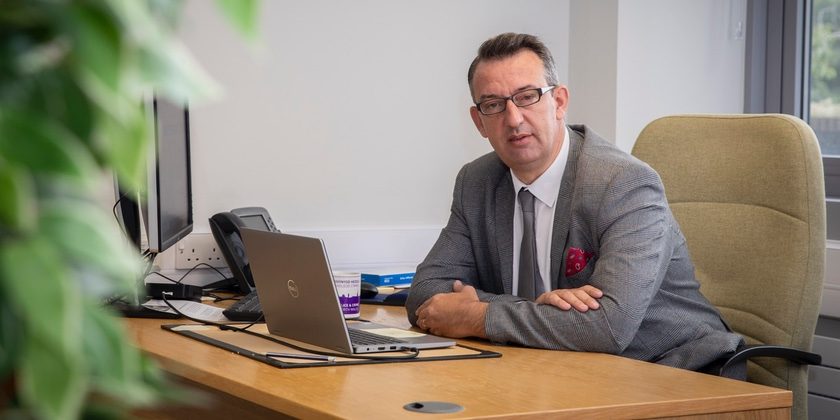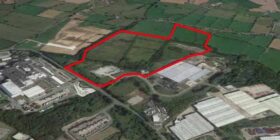Police and Crime Commissioner election Q&A: Andy Dunbobbin – Labour and Co-operative Party candidate

Wrexham.com has invited the four candidates vying for the role of North Wales’ Police and Crime Commissioner to take part in a written Question and Answer session.
On May 2 voters will head to the polls to elect a commissioner whose responsibilities include deciding the budget for North Wales Police and holding the force’s chief constable to account.
In North Wales four candidates have put themselves forward to become the region’s next PCC. These are (you can click to view their Q&A):
- Andy Dunbobbin – Labour and Co-operative Party
- Ann Griffith – Plaid Cymru
- Brian Jones – Welsh Conservative Party
- Richard Marbrow – Welsh Liberal Democrats
We contacted the four candidates with 10 questions about their plans if elected and what they feel are the biggest crime related issues facing North Wales.
You can read Andy Dunbobbin’s – Labour and Co-operative Party candidate – in full below:
1. What are the key crime issues in North Wales that you think need addressing and plan on focusing on in your term in office if elected
Serious and Organised Crime is the key crime area in North Wales. Serious and organised crime causes considerable damage to our communities and people’s quality of life. We know that violence (at street level) is often linked to drugs supply, including county lines operations.
There are also connections between drug supply and use with other forms of crime, such as anti-social behaviour, cybercrime, modern slavery, theft and violence against women and girls. I
have ensured North Wales Police continues to use intelligence and information to identify the biggest threats to our communities.
Arresting and disrupting the activities of criminals wherever they try to break the law. Investment of dedicated teams of officers and staff across North Wales and continued work with the Regional Organised Crime Unit is critical.
I will strive to continue working with the Chief Constable to make North Wales as hostile an environment for organised criminals.
I already collaborate with partner agencies to improve education and awareness of cybercrime, guarding against scammers and fraudsters.
2. There’s still a lot of confusion around what a Police and Crime Commissioner is – if elected how would you raise awareness of the role and your work across the region
I understand about the awareness and confusion surrounding the role of Police and Crime Commissioner, and it has been a prominent thought of mine during this term, resulting in me appointing a Head of Communications and Engagement. Engagement has improved, with an average of 50 articles per month being featured in the media, significant growth on the OPCC social media channels, the introduction of a fortnightly newsletter (850 subscribers) and an increase of visitors to the website (average 9000 visitors per month).
Furthermore, I see the role of the Police and Crime Commissioner as being the bridge between our communities and North Wales Police. I believe in getting out and about, meeting people and being visible myself.
At events, walkabouts, surgeries and county shows; I have made myself available to meet the public and listen to your concerns. I have introduced surgeries during my time in office which had never taken place, prior to my election.
I am determined to do all that I can to ensure that our communities are listened to and receive the best possible police service.
3. Across the UK the reputation of policing has faced fierce scrutiny in the last few years and trust has decreased. Within your role as Police and Crime Commissioner how would you work to rebuild the relationship between the public and police,
We have all seen the highly corrosive impact that bad officers have on the reputation of policing.
In February 2023 I commissioned a report from the Chief Constable that would set out the scale of misconduct in the Force. North Wales Police was the first force in Wales to publicly release such statistics. Openness and transparency are fundamental if we are to regain the public’s trust.
Expecting and enforcing the highest standards is non-negotiable. The Office of the Police and Crime Commissioner oversees the police complaints system, and the PCC is the relevant review body for all complaints.
There is still work to do and we have to constantly review our processes, vetting and recruitment in order to regain and maintain the public’s trust and confidence in policing. It goes back to me saying that I see myself as the bridge between the community and the police.
I will always stand up for victims by giving them a voice – listen to people’s lived experience is what I am about.
I want appropriate support for victims that helps them get on with their lives, using tailored approaches to support people.
We are listening to their lived experiences through our engagement, as only then can we truly improve the response when they call for help.
4. Retail crime has been quite topical lately with assaulting a retail worker to be made a standalone criminal offence. Where does addressing it stand in your priorities and do you have sufficient resources to tackle it.
Having worked in the retail sector and experienced first-hand the risks this can bring, I welcome the recent announcement that assaulting a shop worker will be a separate criminal offence. This is after years of campaigning by USDAW and the Co-operative party.
During my term, I have attended the Senedd’s Cross Party Group on Small Shops where I spoke about retail crime to members and others, including the Association of Convenience Stores.
I have also met the Federation of Independent Retailers on a couple of occasions, developing positive relationships to tackle the issues faced in the whole sector. I want to build on that success.
I have a dedicated pledge in my manifesto, stating that I want to work with the North Wales retail sector further.
Shop assistants and colleagues have the right to go to work and feel safe. Business owners have a right to know that the police are there for them if the worst happens. In North Wales, we introduced the ‘We Don’t Buy Crime’ initiative last year.
I know police officers are active in the community in advising businesses on how to make their premises and operations more secure, and ensuring goods and property can be marked, making it harder for them to be sold on.
The bigger picture is to look at the social reasons behind this rise and how we can ensure that offenders are dissuaded from causing further crime – taking a public health approach.
This means a collaborative and whole systems approach with the Police, alongside commissioned and support services, which runs through my manifesto for fighting crime in North Wales.
5. What relevant experience have you got for the role of Police and Crime Commissioner?
I am the current Chair of Policing in Wales, Interim Chair of Police Digital Services and PCC lead for other technology initiatives – elected by my peers within the Association of Police and Crime Commissioners (APCC).
Technology initiatives include National Law Enforcement Data Service (NLEDS); this will be replacing what is commonly known as PNC and the Forensic Collision Investigation Network (FCIN). Another key responsibility of the Police and Crime Commissioner is being the Chair of the Local Criminal Justice board.
In addition, I also Chair the newly created North Wales Prevention and Reducing Harm Forum which focuses on prevention as this will reduce the impact on our communities and lowers demand on already stretched public services.
I enjoy being challenged and to put forward positive and constructive challenge for the betterment of those I service.
I rigorously scrutinise police perform against priorities set in my police and crime plan. Every quarter I hold the Chief Constable to account through my strategic executive board meeting. I believe that this has led to improvements in North Wales Police’s performance. Crime down and performance up.
6. What are your thoughts on the 20mph policy in Wales and secondly how would you put those thoughts into action as Police and Crime Commissioner?
It is very important to be clear that I, nor policing do not have the power to make laws.
This is also an operational policing matter, of which Police and Crime Commissioner are duty bound not to intervene with.
The decision of where officers are deployed is one for the Chief Constable. That said, I have discussed this with the Chief Constable some months ago and we have an agreed view.
A similar question (regarding the 20mph) was asked at the Police and Crime panel back in June 2023, where the Chief Constable made it clear that officers will be deployed where there is the highest risk of harm and that an evidence-based approach will be taken, of that I am supportive.
I have spoken to many people about the 20 mph with most people agreeing that they have no problem with the implementation of it outside schools, hospitals, doctors and nurseries. And I welcome the recent announcement from the new Cabinet Secretary for Transport.
I look forward in seeing further developments of the 20mph and will ensure that North Wales Police KSI (Killed or Seriously Injured) data is used to make a well-informed decision.
7. The cost of living crisis shows little sign of improving and Council Tax and precepts from all levels have increased. How will you work to keep the policing precept as low as possible while providing value for money?
During my term, the policing precept has been the lowest in Wales. The last precept survey had the best response to date throughout the creation of the Police and Crime Commissioner role, which is pleasing.
From my scrutiny and constructive challenge, working with North Wales Police, over £10 million has been found in efficiencies in my term. However, I am wanting to improve public participation further and have a dedicated pledge in my manifesto.
There is a difficult balance to strike between ensuring that we provide the right level of funding to help keep the people of North Wales safe, while also ensuring that people see value for their money.
I am also under a legal obligation to present a balanced budget, while also ensuring we keep Police Officer and PCSO numbers at mandated levels. So, proposing no increase, or even a cut in the precept, would not have been an option for us, as we would not have been able to fulfil our obligations.
The Police and Crime Panel also exercise their statutory duty in scrutinising the precept proposal of the Police and Crime Commissioner. Having carried out scrutiny on my proposals, they have agreed the proposed increases in the precept because they feel it is justified and will provide for an effective and efficient policing service in North Wales.
8. A common criticism is a lack of ‘bobbies on the beat’ and a drop in visible policing. Is this something you would look to improve if elected as Police and Crime Commissioner and if so, how? If it’s not a priority – why isn’t it?
The reality is that the Tories hollowed out neighbourhood policing, resulting in an increase of competing demands. Due to demand, resources were allocated to response policing – fighting the “here and now.”.
I know how much the effectiveness and efficiency of the Police means to you, your families and our communities. It is a core part of my responsibilities as your Police and Crime Commissioner. It is also contributing significantly towards improving trust and confidence.
Our communities in North Wales rightly deserve a visible policing presence. This includes in our cities, towns and rural areas. By having a visible presence in all our communities, all residents and visitors to North Wales can feel safe and secure.
Neighbourhood policing is the bedrock of society and allows communities to thrive and feel safe. Welsh Labour recognises the importance of neighbourhood policing and has put PCSO’s on our streets to keep our communities safe, despite policing not being a devolved area. Furthermore, 133 PCSO’s have been funded in the last budget.
Labour’s mission is for safer streets, coupled with my number one priority of neighbourhood policing – going back to basics and getting the basics right. And in North Wales, we are already on the path of this journey.
Earlier this year (according to the ONS) North Wales Police topped the forces across England and Wales for public confidence. In addition, the force maintains the second lowest figure nationally for rates of recorded neighbourhood crime per 1000 population and investigation timelines have fallen on average by nearly 40%.
Throughout my term, I have invested heavily in several initiatives which have reduced demand on our neighbourhood policing teams whilst improving relationships between communities and North Wales Police.
Examples include Youth Shedz, “Justice in a Day” and “Don’t steal my future” programmes as well as funding two engagement police vans.
I have also worked with key stakeholders in securing a new police station in Prestatyn as well as plans for one in Holyhead. We are also looking at improving front counter service across the police estate, so people can access the police face to face easier.
If UK Labour are given the privilege to be in government, we will take back our streets from gangs, drug dealers, and fly tippers – with stronger policing, guaranteed patrols in town centres and more criminals behind bars. A visible and approachable Police Service allows people to have regular contact with their local Neighbourhood team.
9. What are your priorities for reducing rural crime and boosting policing in rural communities across North Wales.
A key part of my role as Police and Crime Commissioner for North Wales is ensuring that the rural and farming communities in the region feel represented, know where to turn if they become victims of crime, and are happy with the performance and service of North Wales Police.
Our rural and farming community is integral to the economy and culture of North Wales and I am committed to engaging as much as possible with the rural community.
I have six-monthly face-to-face meeting with representatives of the NFU and FUW so that they can share with me their concerns.
At the one meeting, theft of farming machinery and plant was a topic that came up. Subsequent to this, some may be aware of the high-profile arrests that took place in February 2023 where North Wales Police’s Serious Organised Crime Unit and Rural Crime Team worked with Dyfed-Powys Police and West Mercia Police as part of Operation Calafat.
The arrests followed an investigation into the thefts targeting rural areas such as Tywyn, Dolgellau and Bala.
I have also introduced the “We Don’t Buy Crime “campaign with North Wales Police as a means of reducing thefts, including in rural and farming communities.
The team have developed specific Rural Crime Prevention Packs and will be providing farmers and rural businesses with Smart Water forensic marking, robust deterrent signage, and tailored crime prevention advice.
Working jointly with the police, we launched a new mobile policing vehicle to provide a visible base for North Wales Police Officers and PCSOs to engage with rural communities. It means staff can work away from a station for longer periods of time, as well as being able to invite members of the public inside for meetings or general discussions.
I also attended the launch of the All-Wales Wildlife and Rural Crime strategy last year. This first ever made-in-Wales strategy to integrate rural and wildlife crime and will be vital in bringing Welsh Government, police forces and partners together to tackle such offences.
10. Finally, what are your views on police funding – specifically on local and national levels and how do you think policing should be funded?
After 14 years of Tory cuts and underinvestment, we need sustained and fairer funding to allow Welsh Government, local government, policing, fire, and all other public services so we can plan better.
All public services are intrinsically linked so it makes sense that we take a cooperative approach.
With the inflicted cost of living crisis caused by the UK Conservative government, households are already struggling to make ends meet and I just don’t think it’s fair to keep putting the burden on the local taxpayer.
The current formula doesn’t compensate for poorer areas or areas which have higher challenges in terms of policing and lower income. We need a fairer formula and one that takes proper account of the financial constraints, both in terms of policing needs, but also in terms of the population on which the precept falls.
We need a more immediate solution, and I am keen to explore potential options.
For example, if we were to receive a Barnett consequential population share for the funding for policing, we would have more money afforded to policing in Wales.
This would be an improvement than what we currently have from the current funding formula.
You can read Andy Dunbobbin’s manifesto for North Wales here. More information can also be found on X (formerly known as Twitter) on @acdunbobbin and on Facebook, here.
Spotted something? Got a story? Email [email protected]












